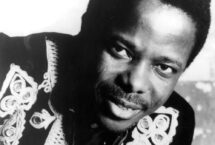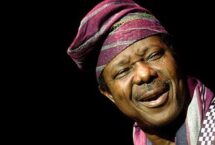Download King Sunny Ade Songs Mp3
25. Iyayariya Kenke
Album – The Child. Release Year – 1988.
26. Malanu Makorin Mafi Gboluwa Ga
Album – Unknown. Release Year – Unknown.
Download Malanu Makorin Mafi Gboluwa Ga
27. My Mother
Album – E Dide (Get Up). Release Year – 1995.
28. Odele Alaga
Album – Unknown. Release Year – Unknown.
29. Orisun Iye
Album – E Dide (Get Up). Release Year – 1995.
30. Semi La Sepe
Album – Unknown. Release Year – Unknown.
31. Aiye Le
Album – Odu. Release Year – 1998.
32. Esibiri biri ke bo mi o
Album – Synchro System. Release Year – 1983.
34. Odun Titun
Album – Check E. Release Year – 1981.
You can download other Nigerian old school songs (1960-2003) here and old school afropop here. Simply click here to access and download a treasure trove of Nigerian throwback music.
King Sunny Ade’s Biography
King Sunny Ade is the undisputed king of juju music, a captivating fusion of Western pop and traditional African music rooted in Nigeria’s guitar tradition. For decades Sunny Ade continue to weave an infectious blend of electric guitars, synthesizers, and multi-layered percussion for his fans all over the world. Born to a family of Nigerian royalty, Ade left school to pursue a career in music.
In the mid-’60s, he performed with a highlife band, Moses Olaiya’s Federal Rhythm Dandies. Ade formed his own band, the Green Spots, in 1967. Frustrated by the exploitation of the record industry, Ade launched his own record label in 1974. In the decades since, the label has released more than 100 of Ade’s recordings in Nigeria. Ade began to attract attention in the western world when three of his albums — Juju Music, Synchro System, and Aura — were released in the early ’80s on the Mango label, a subsidiary of Island Records. Ade & His African Beats made their debut American performances to enthusiastic crowds in 1983.
Although Juju Music and Synchro System showed signs that Ade was going up to live up to the billing as “the African Bob Marley,” Aura was a commercial disappointment and the group was dropped by Island Records. While they released an album, Authority of Your Ticket, in 1990, it too failed to stir much commercial interest. E Dide (Get Up), released in 1995, offered hints that the best days of Ade and His African Beats were yet to come. The group followed it with Odu, a collection of ancient Nigerian songs, in 1998; the album was nominated for a Grammy.
Its follow-up, Seven Degrees North, appeared in 2000. Ade has remained a powerful force in Nigeria. Money received from his early albums has been used to launch an oil firm, a mining company, a nightclub, a film and video production company, a PR firm, and a record label specializing in recordings by African artists. It’s been estimated that more than 700 people are employed by Ade’s companies.
In the mid-’90s, Ade founded the King Sunny Ade Foundation, an organization that includes a performing arts center, a state-of-the-art recording studio, and housing for young musicians and performers on a five-acre tract donated by the Lagos state government. Ade currently serves as chairperson of the Musical Copyright Society of Nigeria.
In 1996, Ade formed a supergroup, the Way Forward, featuring top-notch Nigerian musicians. He and His African Beats have been featured in three films — Juju Music in 1988, Live at Montreux in 1990, and Roots of Rhythm in 1997.
Biography written by Craig Harris.
Disclaimer! All music files on this website are owned by the respective copyright owners and are used for review, research and promotional purposes only.




